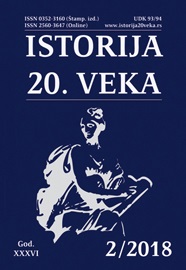Odnos Blagoja Neškovića prema nacionalnom pitanju 1944−1952.
Blagoje Nešković’s Attitude Towards the National Question 1944−1952
Author(s): Ena MirkovićSubject(s): WW II and following years (1940 - 1949), History of Communism, Historical revisionism
Published by: Institut za savremenu istoriju, Beograd
Keywords: Blagoje Nešković; the national question; Serbia; Communist Party of Yugoslavia
Summary/Abstract: This paper analyses the political views on the national question of Blagoje Nešković, prominent personality of Serbian Communist movement un til 1952. During World War II he was elected to the post of secretary of the Provincial Committee of the Communist Party of Yugoslavia for Serbia, after the liberation he was the secretary of the Central Committee of the Communist Party of Serbia and the Serbian prime minister until 1948. In 1952 he became Deputy Prime Minister of the Federal Republic of Yugoslavia, but soon he was accused for opportunistic policy implementation and cooperation with the Com inform, he was forced to resign all party posts and expelled from the Central Committee of Yugoslavia. His case raises many serious questions to explore, such as the freedom of expression of national positions in the new communist Yugoslavia and the position of the Serbian communist elite in relation to the communist elite of Yugoslavia. The Serbian elite were the least compact and the weakest in the new country and owned the highest mortgage from the war and the maximum load as the elite of the largest nation that would later be named the hegemonic. KPJ showed its readiness in order to deal with all those who were able to question the correctness of its policy. Blagoje Nešković was not a suitable person to support the national policy of weakening Serbia at the ex pense of strengthening of Yugoslavia. His dissent in national politics, disap proval of the purchase of policy implementation, representation of Serbian na tional interests and the growing political influence and disobedience led to con flict with Josip Broz Tito, and other political officials, whose policy was exactly the opposite.
Journal: Istorija 20. veka
- Issue Year: 2018
- Issue No: 2
- Page Range: 101-116
- Page Count: 16
- Language: Serbian

